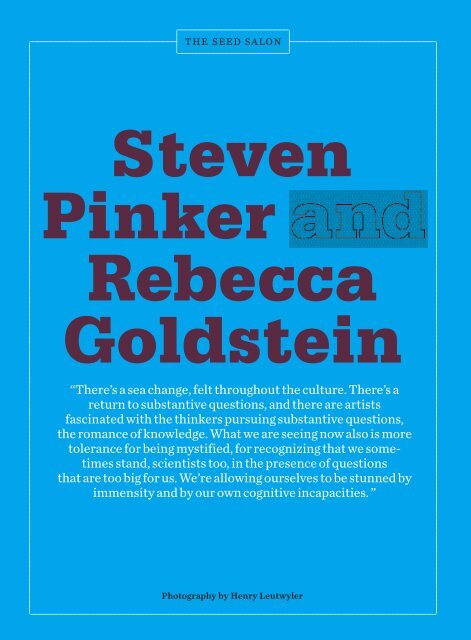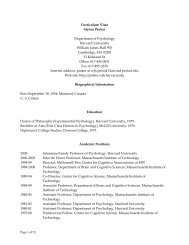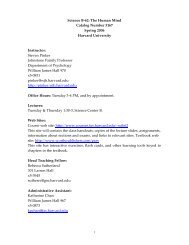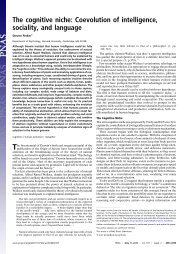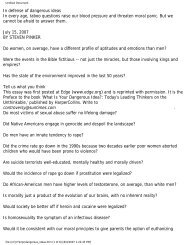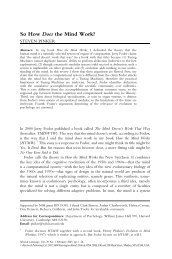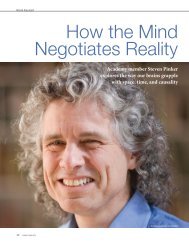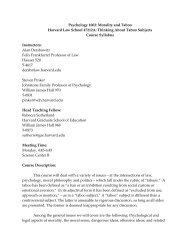The Seed Salon - Steven Pinker
The Seed Salon - Steven Pinker
The Seed Salon - Steven Pinker
- No tags were found...
You also want an ePaper? Increase the reach of your titles
YUMPU automatically turns print PDFs into web optimized ePapers that Google loves.
Rebecca Goldstein (opposite) has a PhD in philosophy fromPrinceton, and has taught at Barnard, Rutgers, and Columbia.Currently she is Professor of Philosophy at Trinity College. She isthe author of five novels (<strong>The</strong> Mind-Body Problem, <strong>The</strong> Late-Summer Passion of a Woman of Mind, <strong>The</strong> Dark Sister, Mazel,and Properties of Light) and a collection of stories (StrangeAttractors). Among her honors are two Whiting FoundationAwards (one in philosophy, one in writing), two National JewishBook Awards, the Edward Lewis Wallant Award, and the PrairieSchooner Best Short Story Award. In 1996 she was named aMacArthur Foundation Fellow. <strong>Steven</strong> <strong>Pinker</strong> (previous page)has a PhD in experimental psychology from Harvard, and hastaught at Stanford, MIT, and Harvard, where he is currently theJohnstone Professor of Psychology. <strong>Pinker</strong>’s research on languageand cognition has won prizes from the National Academyof Sciences, the Royal Institution of Great Britain, and theAmerican Psychological Association. His books, including <strong>The</strong>Language Instinct, How the Mind Works, Words and Rules,and <strong>The</strong> Blank Slate, have earned the William James Book Prize(three times), the Los Angeles Times Science Book Prize, and twoshortlistings for the Pulitzer Prize.May 19, 2004Rebecca Goldstein: It’s nice that we now have this chance totalk. I’ve been a longtime fan of yours. I was blown away by Howthe Mind Works. So many cognitive faculties explained, andsuch a satisfying strategy for explanation: combining the computationaltheory of mind with evolutionary psychology. It’san elegant and powerful theory.<strong>Steven</strong> <strong>Pinker</strong>: Thank you.I’m happy to return the compliment.Your first novel, <strong>The</strong>Mind-Body Problem, is a classicamong people in my field, andI’ve enjoyed all your novels since. <strong>The</strong>y’ve taught me a lot ofphilosophy and physics, and they’re tremendously enjoyableas literary fiction.It seems to me that you were ahead of your time in bringingthemes from science into fiction. We’re certainly seeing moreof that now: Authors are incorporating ideas from science intotheir fiction—together with analytical philosophy, which Iconsider continuous with science. And scientists are seekinginsight from literature and other cultural mediums.Perhaps it’s because many of the ideas that scientists andphilosophers worry about are the same ideas that thoughtfulpeople worry about. How can we know the truth? What is therelation between mind and body? What does it mean to doright or wrong ? Is morality a product of our minds and tastes?Or does it somehow exist outside of us?RG: <strong>The</strong>se are questions you can hardly avoid if you’re at allgiven to self-reflection, though the culture did try to avoidthem for quite a few decades. Scientists were apt to call thesebig questions meaningless, and philosophers were even morelikely to do the same.SP: One question that seems to worry both of us regards realism—theidea that things really exist out there, and are not justsocial constructions or figments of our imagination. Your charactersare obsessed with realism. In Properties of Light, theembittered physicist hates the standard interpretation ofquantum mechanics in which particles don’t really have physicalproperties until they are observed. And in <strong>The</strong> Mind-BodyheroismProblem, the mathematician Noam Himmel staunchly believedhe was discovering aspects of reality.RG: Yes. Noam’s form of mathematical realism can strikelaypeople as eccentric, but I was really just echoing the ideas offamous mathematicians, particularly G.H. Hardy’s in A Mathematician’sApology. Say you ask a mathematician, “What doyou think you’re doing when you do mathematics? Is it likechess, where you make up some rules and see what you can orcan’t do with them? Is math just a bunch of empty tautologies?Or are mathematicians just discovering the implications ofcertain features of thinking, so that you’re really in the businessof psychology? Or are you mathematicians more likephysicists, discovering the facts—not of the spatiotemporalworld but of necessary truths about objective mathematicalstructures?” Most mathematicians would probably choose anoption like the last.SP: Cognitive scientists care about this question because theywonder whether math is just the exercise of certain faculties ofan evolved mind—the number sense, spatial cognition, estimation.Of course this may not be incompatible with mathematicalrealism. Given a creature who, for good evolutionaryreasons, has a mind that can grasp concepts like two, three, andaddition, the nature of mathematical reality gives it no choicebut to conclude that two plus three equals five.But why would a novelist care so much about realism?RG: <strong>The</strong> search for objective knowledge strikes me as a form ofheroism. It can be deeply marked by egotism, of course, andgreat thinkers certainly aren’t necessarily saints. Still, to subjugateyourself to the objectivetruth is a humbling experience.And the life of the mind is filledwith passion, so it’s a fit subjectfor art, as more novelists andplaywrights and moviemakersare finding. Dramatizing the passion of knowledge-seeking is agood corrective for post-modern cynicism.SP: One of your characters, Raizel Kaidish, was passionateabout the idea that morality has an objective reality. Manypeople who believe in the reality of rocks and even numbershave particular trouble swallowing moral realism.RG: <strong>The</strong>y do and they don’t. People are often committed tomoral realism without realizing it. My students often argue formoral relativism on the grounds that anything else is intolerantof other points of view. <strong>The</strong>y’re not willing to regard tolerancerelativistically. Tolerance is a moral value on the basis ofwhich they inconsistently argue that there are no moral values.SP: People are always realists when it comes to their own convictions.RG: One of the arguments for realism—and I’m thinking hereof an argument that I think you make about our realism inregard to the external world of three-dimensional objects—isto show that these beliefs are structural features of our thinkingand we can’t get along without them. When we deny them,we end up contradicting ourselves, and the impossibility ofconsistent doubt provides some evidence for their truth.<strong>The</strong>se deep instincts for realism—whether for physical objectsor moral values—may have evolved because these actually arerealities, so it’s useful to believe that they are.SP: <strong>The</strong> biological argument against cultural relativism is thatit is not just a set of social conventions that vary from culture toculture, like driving on the left or right, but has roots in humanSEED 47
48 SEEDmoralitynature. But many people are just as nervous about this possibility,because they fear that it leaves morality as nothing more thana figment of the wiring of our brain, and still ultimately a sham.But Raizel made me think that there really is a sense inwhich morality has a logic that exists outside of us, and that ourmoral sense may have evolved to grasp this moral reality in thesame way that our faculty of depth perception evolved to dealwith a world that really is three-dimensional.RG: <strong>The</strong>re is something in grasping another person in the fullcomplexity of their own personhood that entails anotherdomain of facts, facts about rights and obligations. <strong>The</strong>re areways that you can and can’t morally treat a subject of experience,especially if that subject is a person. So if we’re realistsabout other persons, perhaps we’re forced to be moral realists.That’s basically the Kantian argument.SP: As long as your welfare depends on the actions of anotherperson—as long as you’re not a galactic overlord—you can’tinsist that they adhere to a code of behavior that you’re notwilling to adhere to yourself. Logically, you can’t make theargument that you have privileged interests that other peoplelack—that there’s something uniquely special about you in theuniverse.RG: In the story you refer to, it’s Raizel’s mother, a Holocaustsurvivor, who makes an argument like the one you’re making—that the immoralist is committing a sort of logical errorin refusing to universalize the mattering he confers on his ownperson to other persons. Sometimes the mistake resides—as inthe Holocaust—in not acknowledging the personhood ofcertain groups of people.SP: Morality, at heart, is theidea that one’s own perspectiveis not privileged—that the onlycoherent code of behavior takesa disinterested perspective thatapplies equally to oneself and toothers.RG: One of the many things I’ve learned from your work is thatthis kind of argument has its basis in our intuitive psychology.Part of the innate structure of our mind is a belief that otherpeople are people in just the way we are. We need this belief tomake sense of other people’s actions and relate those actions todesires, beliefs, hopes, fears, the whole structure of the innerlife. But there’s a moral element in our acknowledging thatother people have all the aspects of subjecthood that we do.SP: <strong>The</strong> ability to take someone else’s perspective may tie intothe moral sense and the forces that led it to evolve—namely,the logic of reciprocity. If we live in a world in which each of us,in the fullness of time, will be in a position to do the other afavor—or at least refrain from hurting each other—and if weboth end up better off if we help each other than if we hurt eachother, then certain moral emotions are expected to evolve. Forinstance, sympathy, where we extend help to someone who wefeel needs it, or gratitude, where we feel warm towards someonewho extends help to us, or righteous anger, when we wantto punish someone who withholds help or causes harm. So anaspect of reality—the inherent benefits of interchanging perspectives—mayhave shaped an aspect of the mind, namely themoral sense.RG: I’m sympathetic to this account of moral reasoning, up to apoint. But I don’t feel that it provides the whole story of what itis to think morally, or the complete answer to why we all moreor less naturally think morally, so that even the moral relativistsin my classroom can’t help slipping into moral realism.<strong>The</strong>re’s something very immediate, though also very complicated,in imagining yourself into another person that we don’tget to by way of game-theoretic calculations. I think the rest ofthe moral story is tied up with a different kind of thinking—narrative thinking.SP: And that brings us back to fiction. One problem for anyonelike me who believes in a fixed human nature, including a fixedmoral sense, is to explain how human behavior could havechanged so radically over a few centuries or millennia. Much ofthe world has seen an end to slavery, to genocide for convenience,to torture as a routine form of criminal punishment, tocapital punishment for property crimes, to human sacrifice, torape as the spoils of war, to the ownership of women. We seemto be turning into a nicer species.RG: <strong>The</strong>re certainly are places on the globe right now wherewe’re regressing dreadfully….SP: But taking a millennium by millennium view, the twentiethcentury may….RG: Seem like a bloodletting of horrible proportions, when infact, statistically….SP: We have a much lower rate of death in warfare than prestate,hunter-gatherer societies.RG: So we’re getting less cruel.SP: We are getting less cruel, and the question is how. <strong>The</strong>philosopher Peter Singer offers a clue when he notes that therereally does seem to be a universal capacity for empathy, butthat by default people apply it only within the narrow circle ofthe family or village or clan. Over the millennia, the moral circlehas expanded to encompassother clans, other tribes, andother races. <strong>The</strong> question is, whydid it happen? What stretchedour innate capacity for empathy?And one answer is mediumsthat force us to take other people’s perspectives, such asjournalism, history, and realistic fiction.RG: Storytelling does it.SP: By allowing you to project yourself into the lives of peopleof different times and places and races, in a way that wouldn’tspontaneously occur to you, fiction can force you into the perspectiveof a person unlike yourself, who might otherwiseseem subhuman.RG: <strong>The</strong>re’s a fundamental role that storytelling is always playingin the moral life. To try to see somebody on their own terms,which is part of what it is to be moral, is to try to make sense oftheir world, to try to tell the story of their life as they would tellit. So in our real life, just in making sense of people’s actionsand in seeing them in the moral light, we’re involved in storytelling.SP: So you agree that fiction can expand a person’s moral circle?RG: I think storytelling, in general, has a moral use. To be in thethroes of a story, to have one’s emotions provoked by another’sstory, is not quite ethics, but it’s kind of the shadowlife of ethics.We train children by telling them stories. We try to get them tofeel their way into other lives, and that itself is something. If wehad no capacity for that there would be no hope. It would justbe all rules that you would follow for fear of being punishedif you didn’t. And that doesn’t amount to becoming a moralagent. But then storytelling can also correct that second sort ofmoral mistake, the one of not recognizing the essential personhoodof certain groups outside your chosen sphere. And that’s
eally the point you’re addressing in speaking about the expansionof a person’s moral circle and the role that fiction can play.SP: One famous example, I guess, is Uncle Tom’s Cabin.RG: Lincoln, when he met Harriet Beecher Stowe, said, “Soyou’re the little woman who wrote the book that made thisgreat war!” He meant that she, as a novelist, got people to seethe enslaved as people. And once you do see that, certain kindsof behavior become impossible.I have a personal story about this. My sister was teachingEnglish at an all-girl high school that was rather racist. So shebrought in a short story, and she had the girls read it aloud. Itwas about a black man, and because the girls were so insensitiveto this issue, they didn’t get the clues about the identity ofthe protagonist until very late in the story, after they werehooked. She said it was like watching a moral awakening. <strong>The</strong>yhad been weeping over this man’s story, inhabiting the point ofview of someone who in real life would have been entirelyopaque to them. And now that they had inhabited this point ofview, would they ever feel the same again?SP: That’s a wonderful example of an answer to the question,“How can a part of the mind that was there all along—thecapacity for empathy, in this case—suddenly be extended to anew target, which may not be evolutionarily natural?” Fictioncan be a kind of moral technology.RG: Storytelling is something that can awaken attentiveness,engagement, and empathy to a life that isn’t one’s own. And tobe attentive, engaged, empathetic: that is moral.SP: Of course, we don’t only listen to stories to expand ourmoral sense. A puzzle that I wonder about is why our speciestakes so much pleasure infictional narratives in general.Storytelling is universal; it’sdone in all cultures. And itemerges early in our lives, as wesee from the delight that childrentake in stories. But why do people devote so much brainpower to creating and appreciating tales of things that aren’ttrue? Literature is a pack of lies. <strong>The</strong>re never was a Hamlet.Eliza Doolittle never existed. But still, we can’t get enough of it.And we also have the sense that storytelling is inherently worthy.It’s not a waste of time to appreciate good fiction.RG: So I’m going to ask the sort of question I learned to askfrom studying you: How could all this storytelling have adaptivevalue? What good does it do the species to sit aroundenchanting itself with make-believe? And it really is a kind ofenchantment. A writer feels it very much, because the enchantmentof writing is of even greater intensity than being anenchanted reader. Plato said it was a kind of madness, which iswhy he didn’t think very much of the literary writers. He exiledthem from his utopia.SP: You have delusions.RG: You’re spellbound. You hear voices. You’re inhabitinganother world. It’s so thick, it’s so deep, it’s so profound, that itcan seem like a half step away from madness. Except one is incontrol, and when the book is finished, the voices go away,which is always reassuring.<strong>The</strong>re’s also the fact that when you are in that thickenchantment, so far away from reality, you’re so much smarter,and that seems mystifying to me. Think of what Shakespeareknew about human nature, things you scientists can explainonly years and years later. And the great writers still knowmore about human nature than you scientists do. <strong>The</strong>re’sgossipsomething about this state of fictive enchantment that puts theenchanted writer in the way of very large truths, and that’s anaspect that’s very mysterious to me. And I’d like you to explain it.SP: [Laughs] I don’t know if I can do that, but I certainly haveworried about the puzzle too. Why is fiction so compelling?Part of the answer might be that it is a way in which we pressour own pleasure buttons. <strong>The</strong>re are good adaptive reasons forpeople to enjoy gossip, namely that it provides compromisinginformation about other people, which allows us to do theequivalent of insider trading. In a sense, fiction is simulatedgossip. You’re a witness to the secret foibles of other people.<strong>The</strong>y just happen not to exist.RG: And it’s true that the great themes of gossip—sex and violence—arethe great themes of fiction.SP: I’ve argued that the pleasure-button theory helps explainmany art forms, like painting and music. <strong>The</strong>y would be evolutionaryby-products, not adaptations. But when it comes tofictional narratives, I suspect there is an adaptive benefit aswell. One problem we all face is how to act in a world that presentsa vast combinatorial space of possibilities, especiallywhen it comes to other people. I can do any of ten things, andyou can do any of ten things in response to each of those tenthings, and I can do ten things in response to your response,and so on. <strong>The</strong>re is an explosion of possibilities that no mortalmind can deduce in advance. What fiction might do is allowpeople to play out, in their minds’ eyes, hypothetical courses ofaction in hypothetical circumstances, which would then allowthem to anticipate what would happen if they ever faced thosesituations in reality.RG: If I’m a bored young wife,living with a provincial doctor,what will happen if I have aseries of affairs with men abovemy social station and get into agreat deal of debt that I can’ttell my husband about? Flaubert figures out the consequencesfor us, so we don’t have to go and actually live through EmmaBovary’s bad decisions.SP: Exactly. He answers the question, What’s the worst thatcould happen?For an adaptive hypothesis to be taken seriously, thereshould be some independent reason to believe that the traitreally is a good engineering solution to the problem. We don’twant to just invent any old story for why some part of the mindis useful, just because we know that the mind has that part. Inthis case, I think there is an independent rationale. It comesfrom the approach to artificial intelligence called case-basedreasoning, in which the best way to solve a problem is to analogizeit to some similar problem encountered in the past, ratherthan cranking out a set of deductions using logical rules. So thesystem keeps a library of cases in memory and refers back tothem when solving a similar problem.Perhaps fiction is a kind of case-based reasoning. It multipliesthe number of scenarios that you have tucked away inyour mind and that you can call on as a guide for a future action.Of course, for that to work, there have to be constraints in thefictional worlds. It can’t be true that anything can happen, orelse what plays out in a fictional plot would have no lessons forreal life. And this gets us back to your observation that novelistsfeel they’re at their most intelligent when they’re creatingfiction. I think the reason is that you have to have, in your ownmind, a model of all of reality, so that Continued on page 97SEED 49
<strong>The</strong> <strong>Seed</strong> <strong>Salon</strong>Continued from page 49?? SEEDyou can place your fictitious characterin a plausible world. You can afford tobe much stupider in real life. When welive our lives, we can let reality determinewhat happens. We don’t have toremember that if you go upstairs youare no longer downstairs, or that whenpeople get angry their face tends toshow it. If you forget, the world willremind you. But a novelist has to keepthat entire world in her head.RG: <strong>The</strong>re’s this tremendous amount tohold in mind that the reader isn’t awareof it. It’s like the kinesthetic sense. Youknow where your body is; you don’thave to look where your legs are rightnow. Well, a reader wanders throughthis reality, knowing without having toconsciously think of all the things thathave to be there. But if the writer violatesthis sense, if there’s an inconsistencyat all, the reader will immediatelyspot it.SP: It breaks the spell.RG: So there’s a lot to carry in your mindwhen you’re a writer. But what’s sostrange to me is that I’ve discoveredthings that I hadn’t known and that Idon’t think I ever could have discoveredexcept by being half out of my mind infictive enchantment. Like the matteringmap.SP: Which is?RG: Well, it’s this idea that one of myfictional characters, Renee Feuer, in<strong>The</strong> Mind-Body Problem, came up with.One of the ways that you can understanda person is to understand whattruly matters to them, what zone theyoccupy in the mattering map.SP: So, in the mattering map of a typicalacademic, clothes count for nothing.Intelligence is the only thing that matters.RG: If somebody tells me, “Nobody’sworn that since 1983,” what do I care?That’s not my zone of the matteringmap. Renee Feuer came up with an elaboratetheory of mattering maps, and I’velearned that this idea is now used in certainbranches of psychology. I wouldsay that I was the one who first formulatedit, only that feels slightly dishonest.My character formulated it, or I didwhen I was trying to think like her, orwhen I was her. This state of fictiveenchantment can put you in a strangerelationship with your own identity,kind of hovering outside of it. That happenswhen you’re deeply reading too, ofcourse, but even more so when you’rewriting. And that weird hovering putsyou in the way of big truths. That’s myimpressionistic, nonscientific explanationfor why writers are smarterwhen they’re writing fiction than whenthey’re not.SP: What about science fiction, or fantasy,or magical realism?RG: <strong>The</strong>re are still a hell of a lot of factsto keep straight—SP: Yes, and I guess it’s only a few circumscribedaspects of reality that areexplicitly contradicted. <strong>The</strong> rest of reality,the reader assumes, works the way ithas always worked. Otherwise, anythingcould happen, and I suspect peoplewould get no pleasure out of fiction.RG: <strong>The</strong> imagination is a cognitivefaculty that’s greatly underrated. Imaginationis extremely important in science,as well. One of my favorite quotesfrom Einstein was something like,“When I look at myself, and my ownmethods of thinking, I have to draw theconclusion that my gift for fantasy hasmeant more to me than my talent forabsorbing positive knowledge.” So Einsteinwas a fantasist, too. Special relativityarose out of his famous thoughtexperiment of trying to imagine himselfriding a light beam. That rigorous theoryoriginated in an act of imaginativefancy.SP: My former colleague Roger Shepardhas argued that every major findingin the history of science was first discoveredthrough imagination, or atleast could have been. Galileo couldhave discovered that objects fall at thesame rate regardless of what they weighby imagining two one-pound weightsfalling side by side, and then imagininga drop of glue joining them into a singletwo-pound object. Of course, that dropof glue couldn’t have sped up the fall!And Roger showed that many greatscientists were like Einstein. For example,Maxwell, of equation fame, beganby visualizing electromagnetic fields asif they were elaborate sheets and fluids.RG: Analytic philosophers are alwaysmaking up stories, too.SP and RG: <strong>The</strong> Thought Experiment.RG: Sometimes the stories are veryelaborate. Can you blow up a fat guywho’s blocking the exit to the cave, if 20people are inside about to die? Or iftime travel is possible, can you go backin time and kill your great-grandmotherbefore you were born?SP: What would happen if a lighteningbolt hit a swamp, and the droplets of goojust happened to coagulate into a molecule-by-moleculereplica of myself?RG: Lots of highly imaginative storiestold. But they’re not enchanting in theway that fiction is enchanting. <strong>The</strong>seare stories constructed precisely tofigure things out, and because of thatyou’re never in danger of falling under aspell, stepping out of your identity. Nomatter how imaginative these thoughtexperimentsare, you experience themas a form of argumentative reasoning.<strong>The</strong>re’s the pleasure of good thinking,at least when the thinking is good, butthere’s not the distinctive pleasureof fiction.SP: In some cases, thought experimentshave been incorporated directly intomediocre science fiction. Back to theFuture, for example, was based on yourthought experiment about time travel,and <strong>The</strong> Matrix was Descartes’ evildemon brought to life. Many episodesof <strong>The</strong> Twilight Zone and Star Trekwere philosophers’ thought experimentsstaged for the camera.So what is the extra ingredient that agood novelist supplies? Is it some combinationof the two parts of fiction wediscussed—the cognitive advantages ofseeing how hypothetical scenarios playout, together with the emotional pleasuresof empathizing with a character towhom good things happen?RG: I think you’re right, that you can’tdiscount either factor—although Ithink it’s more the pleasure of feeling alife that’s not your own, not necessarilyvicariously participating in good fortune.Tragic art provides some of thedeepest aesthetic pleasure of all.Another factor that might contribute tothe deep pleasure of storytelling is thatit confers significance. Stories, unlikelife, have a point. We’d like to think thatour lives have a point, though we oftensuspect otherwise. But stories areshaped around points, even if the pointof the story is the pointlessness ofour lives.SP: This may connect to our originalquestion, namely, why are we only nowseeing a convergence of science andculture? Perhaps it’s because scienceand philosophy themselves havechanged in the last 30 years. <strong>The</strong>y arestarting to address themselves far moreto the themes that ordinary thoughtfulpeople care about. As I recall, one ofRenee Feuer’s frustrations with her
career in philosophy was that philosophyhad abandoned all interesting questionsand instead was just trying toexpose fallacies of reason that camefrom unclear language.RG: Philosophy just got so modest. It’slaudable to try to be clear and precise,but in philosophy you have to risk a littleimprecision or you’re going to end upsaying nothing at all.SP: We’re seeing philosophers grapplingmore with the substantive problems oflife, like the self, morality, consciousness,after having abandoned them asmeaningless.RG: Philosophy is subservient to the sciences.It’s often trying to explain thephilosophical implications of the sciences,to clarify, do clean-up work. I havethis terrible image right now of the guysin the circus following after the elephants,cleaning up.SP: [Laughs] While philosophy was dominatedby logical positivism, psychologywas dominated by behaviorism, whichalso denied that there was any meaningto concepts like emotions, images, morality,will, and consciousness. It’s onlyrecently that the science of mind has consideredthose to be respectable topicsagain. So perhaps it’s natural that fiction,which has always dealt with those problems,should only now be getting inspirationfrom the sciences.RG: I think that your field in particular,and specifically your work, has had suchradical philosophical implications interms of consciousness, the self, intelligence,the moral sense. People like youhave helped force philosophers backinto philosophy.SP: Even cognitive science was, for manyyears, devoted only to the nerdiest partsof our minds, such as recognizing shapesand stringing words into grammaticalsentences. One reason evolutionary psychologyhas became so popular is notthat it invokes evolution but that it dealswith the problems that laypeople considercentral to their experience but thatwere long banned from the psychologycurriculum. Love. Sex. Family. Status.Dominance. Motherhood. Gossip. Religion.Play. Food. Beauty. Jealousy. Disgust.One might think that these wouldbe basic topics in any science of thehuman mind. But don’t try to find themin the psychology textbooks. Evolutionarypsychology is trying to win backa place for them.RG: <strong>The</strong> theory of the mind that you’vegiven us is making them amenable, atlong last, to rigorous explanation. I thinkit’s a very good sign for our culturethat your books sell so well. This theoryis not only intellectually exciting, inthe way that good science is, but itglobally changes the way to regard somany aspects of human life. It’s deeplytransformative.SP: Which may be why you see evolutionarypsychology and cognitive scienceappearing in the fiction of peoplelike Ian MacEwan and David Lodge.RG: <strong>The</strong>re’s a sea change, felt throughoutthe culture. <strong>The</strong>re’s a return to substantivequestions, and there are artistsfascinated with the thinkers pursuingsubstantive questions, the romance ofknowledge. What we are seeing now alsois more tolerance for being mystified, forrecognizing that we sometimes stand,scientists too, in the presence of questionsthat are too big for us. We’re allowingourselves to be stunned by immensityand by our own cognitive incapacities.SP: One of the ironies of treating themind as a part of the natural world, as aproduct of evolution, is that one expectsthere should be problems that the mindis incapable of grasping, simply becauseof the way it’s put together. You wouldn’texpect a rat to learn a maze in which thefood is placed in the prime-numberedarms—not because there’s anythingmystical about prime numbers, butbecause that’s not the way a rat brainworks. For the same reason, there maybe limitations to the way the humanbrain works that make certain problemsLABORATORY<strong>The</strong> Skies OverBirminghameternally paradoxical. One of the problemsmight be what philosophers call the“hard problem of consciousness.”RG: <strong>The</strong> “easy” problem of consciousnessyou guys solved. Or at least youknow, basically, the sort of explanationto look for. Those are the problems youtake on in How <strong>The</strong> Mind Works, subjectingthem to the powerful explanatorymachinery of the modular and computationaltheories of the mind andDarwinism.SP: “Easy problem” is said with a smirk,because there’s nothing scientificallyeasy about it. But at least they aretractable. <strong>The</strong>se are questions like,“What’s the difference between consciousand unconscious informationprocessing, and where are they found inthe brain? Why, in terms of engineeringdesign, would a brain have evolved tosegregate certain kinds of informationand make them accessible to decisionmakingand verbal report, and to seal offother kinds in dedicated processors?”We don’t have answers to these questionsyet, but I think we will.Whereas the hard problem—RG: That’s the traditional problem, themind-body problem, that we haven’tsolved.SP: Yes—why consciousness, in thesense of first-person subjective experience,should exist at all. Why it shouldfeel like something to be a heap of firingneurons.RG: <strong>The</strong>re’s something poignant andironic about the situation that we’re in.At dawn on May 13, residents of Birmingham, England, were serenadedby music from the heavens. Seven hot-air ballons, broadcastingsoothing melodies, bathed the sleeping city in an aural tapestryorchestrated by sleep psychologists. <strong>The</strong> goal of this magnificentfloating installation, organized by musicians Luke Jerram and DanJones, was simply to stimulate sweeter dreams.SEED ??
We’re inhabiting these minds, which insome sense we know very intimately.We’re also learning ever more about ourminds from scientific fields like yours,which explain how so much of intelligence,so many different cognitivecapacities that we have, are computational.But then there’s this extra factabout our minds: It feels like somethingto have them, to be undergoing thesecomputational processes. And why thatis still something we don’t have a clueabout. That’s the question that isn’t computational.SP: Which, tragically, is the most indubitablething we know. Namely, that weare conscious, as Descartes famouslypointed out. So Descartes might havehad the last laugh after all, even if hebecame something of a laughingstockamong scientists, as we see in book titlessuch as Descartes’ Error and GoodbyeDescartes.RG: He’s the general-purpose whippingboy in philosophy and in science.SP: Because of his dualism.RG: He isolated the hard problem of consciousness,which was good, but then hewent ahead and drew an ontological conclusionthat attracts derision. Seeing theobstacles to explaining consciousnessscientifically, he inferred that consciousnessisn’t located in the body. Accordingto him, the subject of experience isn’tidentical with the body and there you getyour good old “ghost in the machine,” asthe philosopher Gilbert Ryle facetiouslydubbed it.SP: Today we would say that consciousnessis undeniably a manifestation of thephysiology of neural tissue. You don’tneed extra ghostly stuff. But we can’treally explain why it should feel likesomething to be that tissue, perhapsbecause our minds just don’t work in away that would allow us to understandthe explanation. Perhaps an extraterrestrialwith a brain that worked in a slightlydifferent way could understand it.RG: It’s amazing that we’ve managed toget as much of a grasp of the world as wehave.SP: Given that the mind is a biologicalgadget.RG: Given that the mind is a gadget thatevolved in an environment where wewere basically trying to solve problems ofhunting and gathering, evading predators….SP: Prospering in a social milieu.RG: <strong>The</strong> fact that the mind evolved todeal with those concrete situations andit has applied its cognitive capacities todoing string theory and figuring out howthe mind works is pretty amazing. So thethought that it can’t grasp everything,particularly about itself, doesn’t seemsurprising, does it?SP: In fact it would seem to be necessary,if we really are evolved creatures and notangels. Only angels could understandeverything about everything.RG: And we’re no angels. [Laughs]Before we call it a day, I want to knowwhat new book you’re working on andhow long we’ll have to wait to get it.SP: I just finished editing Best AmericanScience and Nature Writing 2004, whichwill come out in September. In a coupleof years I hope to complete <strong>The</strong> Stuff ofThought: Language as a Window onto theMind, which is about the elementaryways of thinking and feeling from whichour thoughts are composed, and howthey reveal themselves in the structureof language. What is your next project?RG: I’m taking a little respite fromfiction. I’ve just finished a book on themathematical logician Kurt Gödel, andhis incompleteness theorems, for theNorton series “Great Discoveries.” Halfof the book explores the proof of the theoremsand its implications, and half triesto penetrate this enigmatic man. He, too,was an ardent realist about mathematicaltruth.SP: It’s not just a game.RG: Not for Gödel. His famous theoremswere inspired by his mathematical realism.He’s the kind of character I love towrite about, passionate about ideas, misinterpreted.Only of course he’s not oneof my characters.SP: He existed.RG: But he’s perfect anyway.Criminal ScienceContinued from page 63element of the “aggravating” factorsneeded to secure a capital conviction.In 1985, DNA testing wasn’t availableto provide definitive answers aboutwhose semen it was. Instead, the prosecution’scase relied on the analysis andtestimony of FBI forensic serologistSpecial Agent Paul Bigbee, who said thesemen came from a “secretor” with typeA blood and that House was a type Asecretor.Bigbee, a prosecution witness, wasasked by General Phillips during House’soriginal trial if Little Hube could havebeen the semen donor. Bigbee replied, “Iwas not able to determine his secretorstatus.”“OK. And he is definitely not a secretor?”“I don’t know whether he is or not. Icould not determine that.”When testing for secretor status, scientistslook for the “Lewis factor”—a blood antigen unique to a secretor. Twobodily fluids can be tested for the Lewisfactor: blood and saliva. Blood is the lessconclusive; saliva, however, always producesa definitive answer. Bigbee did testLittle Hube’s blood to ascertain hissecretor status. And, exactly as he statedin his testimony, the results were inconclusive,and he was “unable to determine”Little Hube’s secretor status. ButBigbee never tested a sample of LittleHube’s saliva, a procedure guaranteeinga result. No saliva sample was sent by theprosecution, and Bigbee never requestedone.At trial, General Phillips quicklyasked Bigbee,“But you know that Mr. Housedefinitely is a secretor?”“Yes, sir.”It’s hard to fathom why no saliva wastested, given the weight attached by theprosecution to the secretor evidence.What is apparent is that a line of investigationthat may have provided exculpatoryevidence for the defense was notpursued fully.Another key piece of evidence wasn’taired: Before TBI Special Agent Scottsent Little Hube’s blood for testing,Little Hube admitted he’d had sexwith Carolyn on the day of her death. Hisstatement was never seen by thedefense.Whatever obfuscation may havetaken place during the original trial, newscience has now proven whose semenwas on Carolyn’s clothes. An independentlaboratory, California-based ForensicAnalytical, performed DNA typingon House’s blood and compared it toDNA extracted from the semen stains.<strong>The</strong> result was definitive: <strong>The</strong> DNA in thesemen wasn’t House’s. A second round oftests by North Carolina molecular biologyconsultants LabCorp confirmed thatDNA from the semen was a match withLittle Hube—who proved to be a type Asecretor.THE BLOOD Carolyn’s blood, smeared allover House’s jeans, appears to be aninsurmountable obstacle to claims ofHouse’s innocence. But it is possible this


